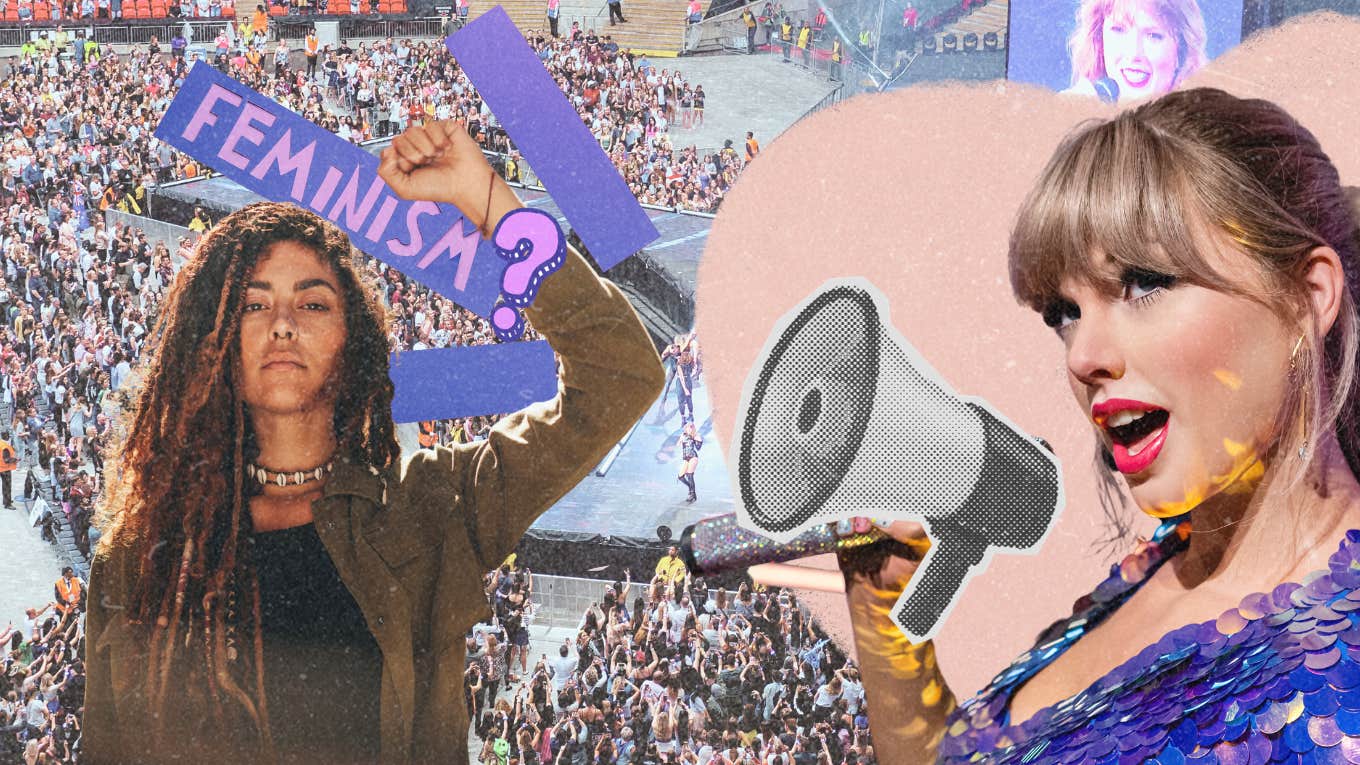Why Taylor Swift Fans' Use Of 'Weaponized Feminism' Is So Dangerous
Many note that Swift's brand of feminism is more about protecting herself than lifting other women up.
 ako photography, carloprearophotos | Shutterstock, Jacob Lund | Canva
ako photography, carloprearophotos | Shutterstock, Jacob Lund | Canva Taylor Swift’s public presence is a lightning rod for conversations about artistry and womanhood, influence and privilege. Nothing Swift does is small, which is why some people have been voicing their concern about how she conceives of feminism as an entity and the calculated way she wields it.
A woman who goes by the username FlowerSeaSand on TikTok made a stitch video building on the perspective that “Taylor Swift uses feminism to tell people they can’t be mean to her, instead of using it for its actual purpose.”
Taylor Swift and her fans often use feminism to shield the singer from negative critique.
FlowerSeaSand expressed her belief that “Taylor Swift has a history of this type of behavior, weaponizing feminism against people who criticize her or make jokes at her expense.” She contended that Swift not only weaponizes the overarching concept of feminism for her own benefit, she also “weaponizes her fan base in the name of feminism.”
She referred to a cultural zeitgeist moment from 2012 when Tina Fey and Amy Poehler hosted the Golden Globes and made a “boyfriend joke” about Swift in their monologue. Swift reacted by proclaiming, “There’s a special place in hell for women who don’t support other women.”
Swift wasn’t wrong about women who cut down other women, yet she neglected to acknowledge that she, too, has done the same thing.
FlowerSeaSand gave a recent example of Swift using a narrow form of feminism for her own benefit. In 2021, the Netflix series Ginny & Georgia included a line that referred to a character “going through men faster than Taylor Swift.” Swift took to Twitter to call out the show for “its lazy, deeply sexist joke.” She proclaimed, “How about we stop degrading hard-working women by defining this horse s–t as funny.” She ended the post by saying, “Happy Women’s History Month, I guess,” along with an emoji of a broken heart.
The tweet was a rallying cry for Swifties to attack Antonia Gentry, the actress who delivered the scripted line. FlowerSeaSand noted that “if there’s one thing we know about Swifties, it’s that they’re always going to go to the mat, they’re always going to go to the most extreme. They’re always going to find a way to incorporate some violent, racist rhetoric.”
Tearing anyone down to lift yourself higher plays on the inherent power imbalances that are built into our societal structure. Yet Swift's presence seems to do just that, guiding fans to defend her in the name of a type of feminism that leaves others out, even causing active, vitriolic harm.
In a follow-up post, FlowerSeaSand shared comments from Swifties who didn’t like her interpretation of Miss Americana’s feminist leanings.
The messages veer from strange to cruel to outright racist, which proves FlowerSeaSand's original point. Swift is uniquely able to rile up her fanbase, using a generic and exclusive form of feminism as a warped mirror, deflecting accountability for her own personal and political shortcomings.
Let’s be clear: Every single one of us will fall short of our intentions at some point in time. No person is perfect. Yet all people should strive to be better. We all need to do the work to become more compassionate and inclusive versions of ourselves.
Swift seems to actively disengage from the concept of intersectional feminism, which causes harm to women and other people on the margins.
In 1989, legal scholar Kimberlé Crenshaw defined intersectionality as a framework to understand the ways various identities and issues overlap to affect people in different ways.
In a 2020 interview with Time Magazine, Crenshaw stated that intersectionality is “basically a lens, a prism, for seeing the way in which various forms of inequality often operate together and exacerbate each other.”
Crenshaw noted that a crucial part of intersectionality is interrogating “all of the ways our systems reproduce these inequalities, and that includes the privileges as well as the harms.”
By ignoring her own role in how systemic harm is upheld, Swift essentially gives herself a free pass.
A lack of introspection is a great way to never change, and it is solely through change that we evolve as people. As FlowerSeaSand stated, Swift uses feminism as though she “wants to create a litmus test of who’s the most feminist,” an innately divisive move. She defined Swift’s brand of feminism in the context of an “arrested development,” maintaining that she “has a very middle school concept of feminism,” one lacking nuance.
“It’s never about her examining her own feminism, about her own activism, about what she’s doing,” FlowerSeaSand explained. “It’s always about her pointing the finger at other people who are doing things that hurt her feelings.”
Despite the way Swift's approach to feminism may be lacking, she's still a powerful creative force.
She still has value, just by virtue of being human. No person is entirely good or bad. We all exist along a wide range. There is always more work to be done, on ourselves and the wider world. If Swift is truly a feminist, she needs to expand her definition to amplify other women beyond herself.
Alexandra Blogier is a writer on YourTango's news and entertainment team. She covers celebrity gossip, pop culture analysis and all things to do with the entertainment industry.

